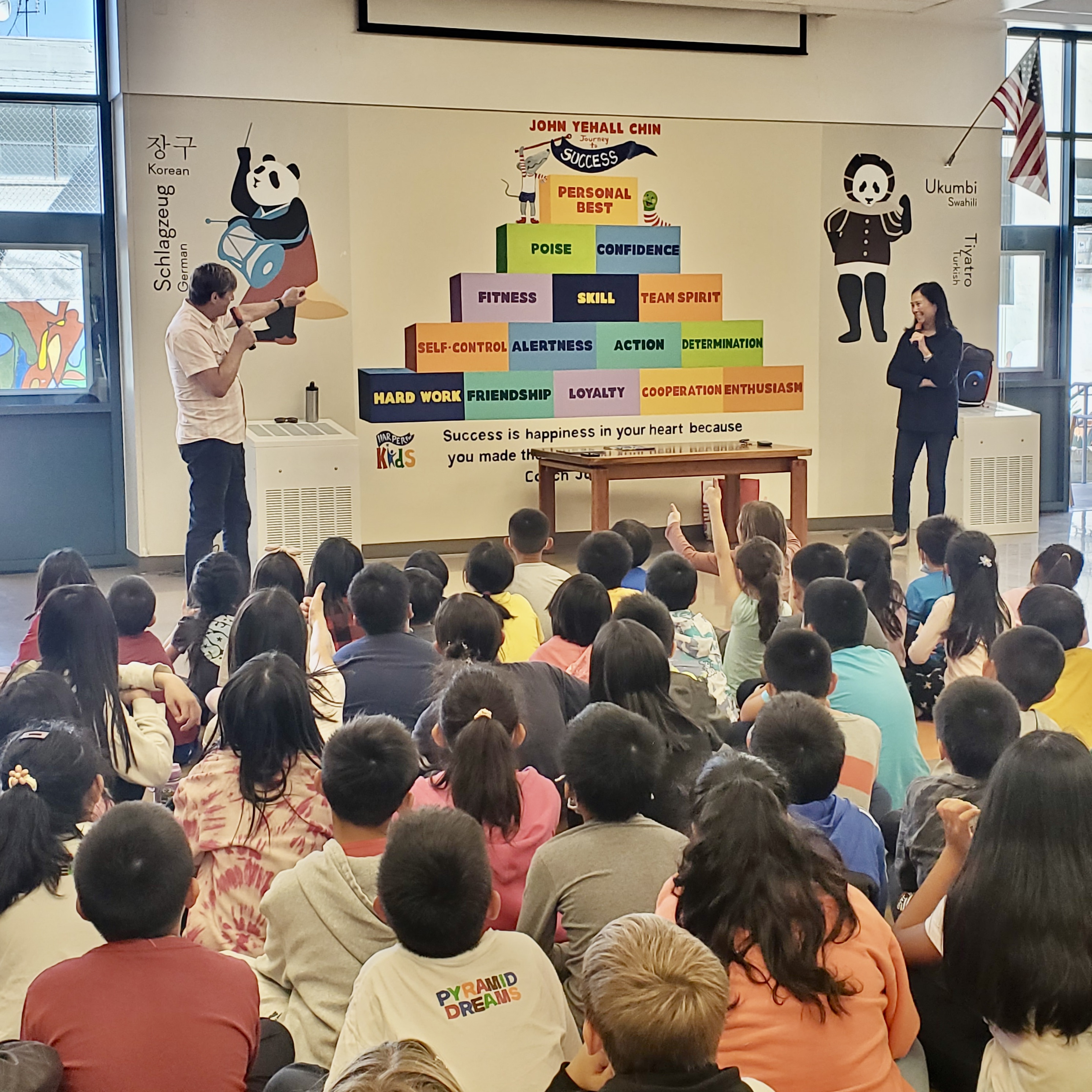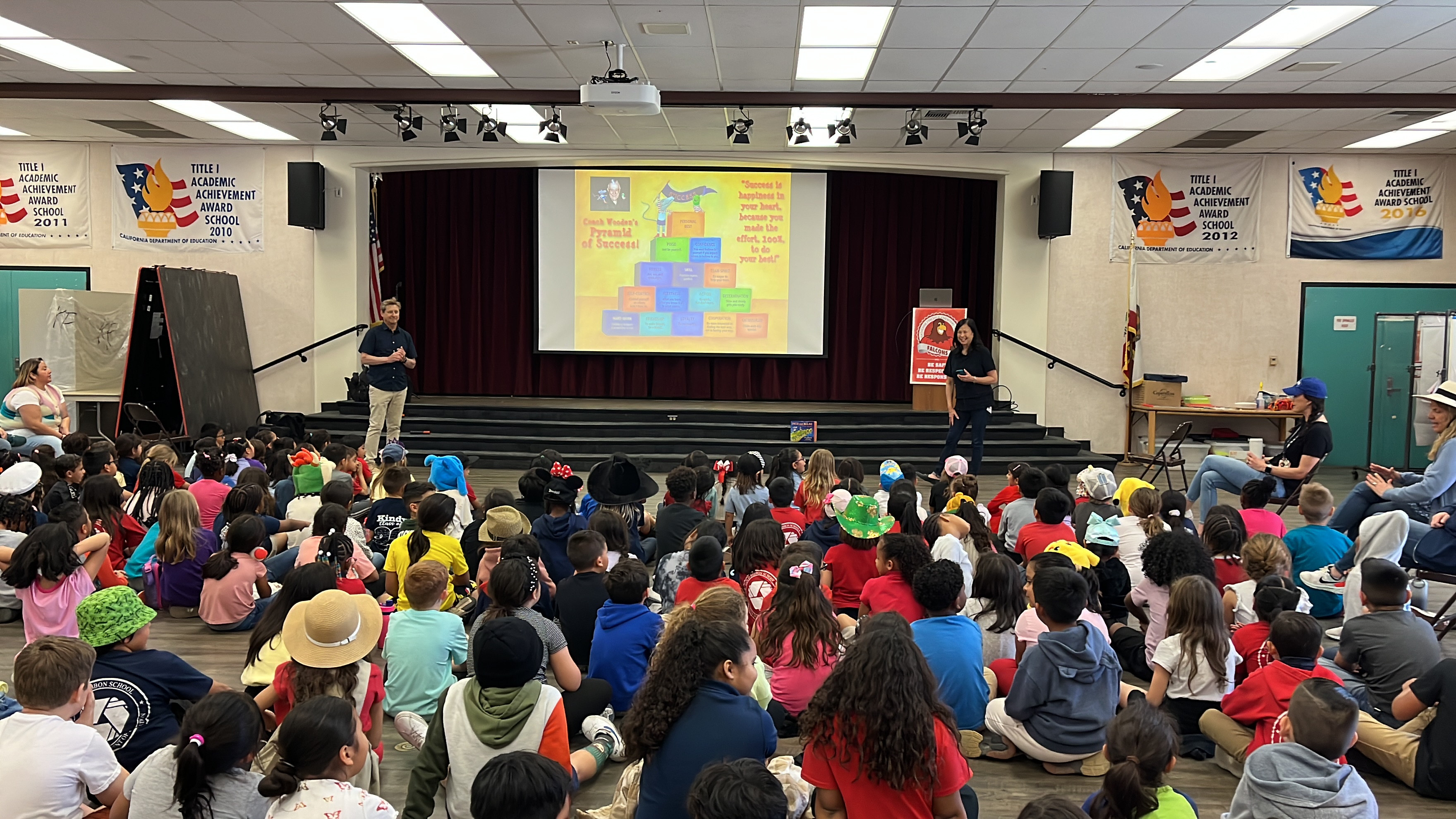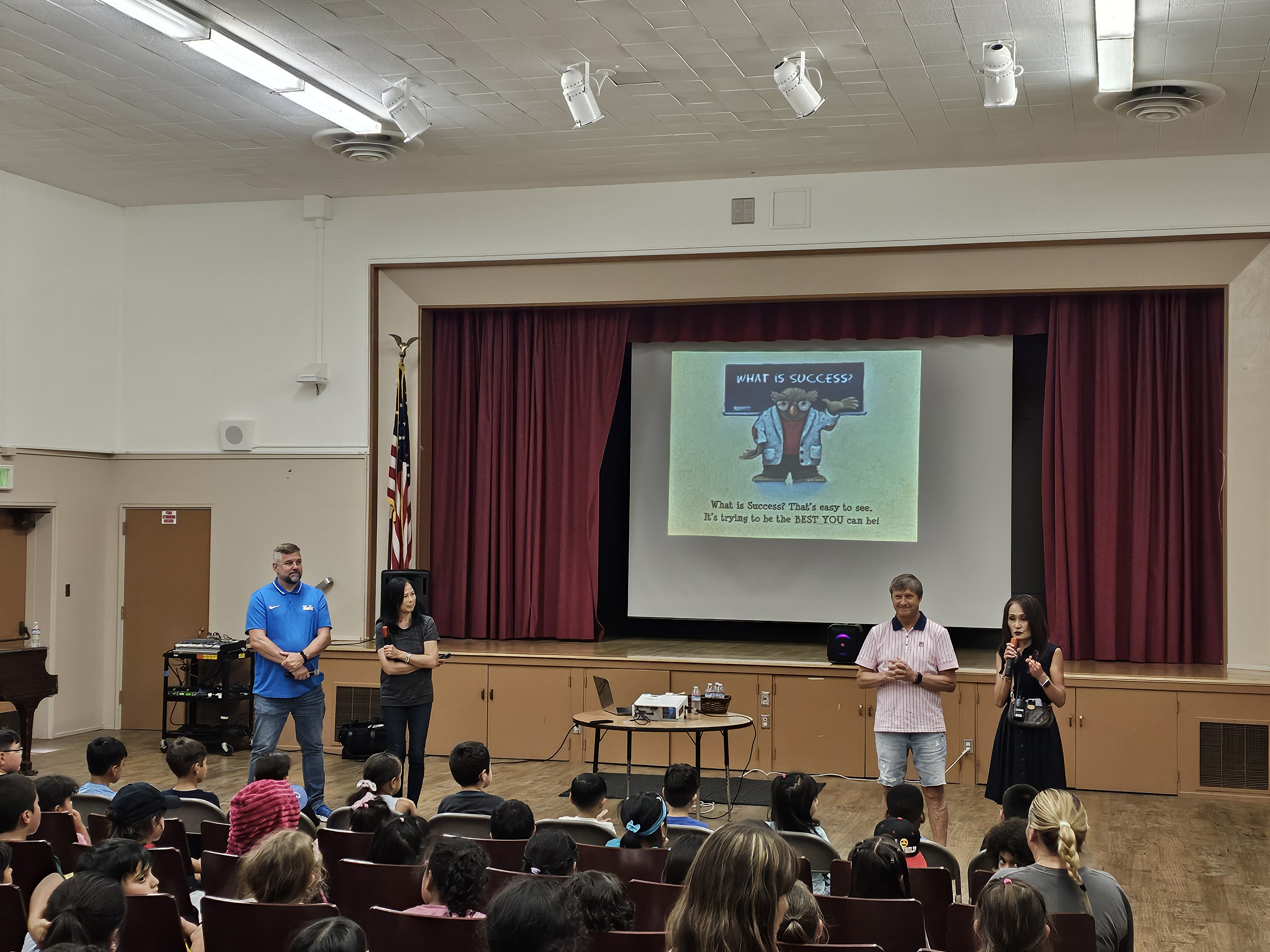Harper for Kids uses picture book to teach children John Wooden’s philosophy
Pictured are Peanut Louie and Tim Harper smiling for the camera in front of the John Wooden’s Pyramid of Success. The Harper’s started Harper for Kids to bring skills for success to K-12 students. (Courtesy of Peanut and Tim Harper)
By Gavin Meichelbock
Oct. 21, 2024 12:18 p.m.
This post was updated Oct. 29 at 8:15 p.m.
Tim and Peanut Louie Harper are helping kids climb John Wooden’s Pyramid of Success one page at a time.
Harper for Kids is a nonprofit organization that has been passing on the teachings of UCLA’s very own award-winning basketball coach Wooden for over a decade. Despite running a small organization, Tim Harper and his wife, Peanut Harper, have worked with hundreds of schools to help kids learn valuable life skills through Wooden’s Pyramid of Success. Today, this children’s nonprofit has been the recipient of awards such as the “Multiplying Good One in a Million Award.” These accolades stem from the idea to package Wooden’s teaching into the children’s picture book, “Inch and Miles: The Journey to Success.”
“That children’s book … condensed all that information into a portal for young kids,” Tim Harper said. “If you can get this in your brain at your age, you might be way ahead in the game with being successful in life.”

After reading “Wooden: A Lifetime of Observations and Reflections On and Off the Court” over two decades ago, Peanut Harper said she found Wooden’s teachings reflected in her upbringing and wanted to make it accessible to a younger audience. She said she then reached out to her and Tim’s friend, Steve Jamison, who also worked on “Wooden” in 1997. Together, they pitched the legendary coach on adapting his Pyramid of Success into a kid’s book, Peanut Harper said. Wooden was enthused by the idea, and the three of them began writing “Inch and Miles: The Journey to Success” in 2001, Peanut Harper said.
While initial feedback from parents during the writing process suggested limiting the pyramid to only six blocks, the original 15 made the cut because of how each one resonates with people differently, Peanut Harper said. On his favorite step of the pyramid, Tim Harper said “enthusiasm,” because he believes the point of life is for people to do what they love. Peanut Harper said she is partial to “team spirit” because the animal used to represent that block in the story, Louie the Lion, is named in honor of her dad.
Off the back of two years of writing, editing and drawing, “Inch and Miles” was published in 2003, Peanut Harper said. While the book was on the Southern California portion of its tour, she said teachers told Wooden how they implemented the novel into their classrooms. This positive response got her and her husband thinking about bringing the impact of their book to Northern California, she added. They collaborated with a friend who helped them establish a children’s nonprofit in 2008, which would later be known as Harper for Kids, Peanut Harper said. By 2010, Peanut and Tim Harper were already volunteering with schools and had seen healthier academic environments flourish as a result, she said.
“Our students are showing really a positive attitude toward academics, and it really shows them that they can achieve anything,” Yoshim Yang, principal of Vanalden Avenue Elementary, said. “It really shaped our school culture to see the Pyramid of Success … as life skills, not just academic skills.”

On the influence of Wooden’s teachings on her school, Principal Yang said its staff, students and parents all truly believe in his philosophy. Tim Harper also said he has noticed a significant decrease in referrals and principal’s office visits at the schools they have worked with. While “Inch and Miles” is a huge helping hand as to why the kids have picked up Wooden’s Pyramid so quickly, another way Harper for Kids shares these life lessons is through featured presentations by NFL and Olympic athletes, Peanut Harper said.
“There’s so many good role models that exemplify each and every one of these blocks on the Pyramid of Success and emphasize that it’s so important to have good character,” Peanut Harper said. “That’s a big part of how we want students to shape their definition of success and find a positive way to define it.”
Ric Coy, the assistant athletic director of student-athletic development at UCLA Athletics, has done many presentations for Harper for Kids. These presentations focus on Wooden’s history and the importance of the pyramid, Coy said. Even though the topics from these guest speakers are more mature, Coy said he is always impressed with the kids’ ability to use examples when asked about their favorite attribute of the pyramid. When talking about their homework, kids often tell Coy they combine enthusiasm with hard work to make their assignments more enjoyable, he said.
Peanut Harper said they have helped hundreds of thousands of students over the past 17 years. Despite their triumphs, Tim Harper said they are one of the few groups that are passing Wooden’s profound words onto the next generation. The lack of a core character education program in primary schools is something Yang said she has noticed the effects of over her 29 years of teaching.
“There has been a huge shift in how the children relate to each other,” Yang said. “They’re not as compassionate, they’re not as thoughtful toward each other.”

The growing impersonality in kids these days is why Harper for Kids’ mission statement has remained the same since 2008, to pass on Wooden’s philosophy of success to as many people as possible, Peanut said. While it may appear to be an uphill battle, Peanut and Tim Harper will continue to endeavor to help as many schools as possible because, just like Wooden, they believe success is about achieving a personal best.
“If we can help kids start to think about, ‘Oh, success is that. I can be proud of myself, no matter the result,’ that can just change their whole outlook on life,” Peanut Harper said. “(To) not be so tough on themselves, really be able to take those small steps in the positive way that can help them not give up, not be afraid to fail and not compare themselves to others.”
